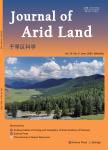Gross nitrogen transformations and N2O emission sources in sandy loam and silt loam soils
在沙的沃土和淤泥沃土土壤的粗野的氮转变和 N2O 排放来源作者机构:Jiangsu Key Laboratory of Agricultural MeteorologyNanjing University of Information Science&TechnologyNanjing 210044China Department of Agricultural Resources and EnvironmentNanjing University of Information Science&TechnologyNanjing 210044China
出 版 物:《Journal of Arid Land》 (干旱区科学(英文版))
年 卷 期:2021年第13卷第5期
页 面:487-499页
核心收录:
学科分类:07[理学] 070602[理学-大气物理学与大气环境] 0706[理学-大气科学] 0713[理学-生态学]
基 金:financed by the National Natural Science Foundation of China(41301345 41101284)
主 题:gross N transformation rates 15N tracing N2O emission sources sandy loam silt loam semi-arid region
摘 要:The soil type is a key factor influencing N(nitrogen)cycling in soil;however,gross N transformations and N_(2)O emission sources are still poorly *** this study,a laboratory 15N tracing experiment was carried out at 60%WHC(water holding capacity)and 25℃to evaluate the gross N transformation rates and N_(2)O emission pathways in sandy loam and silt loam soils in a semi-arid region of Heilongjiang Province,*** results showed that the gross rates of N mineralization,immobilization,and nitrification were 3.60,1.90,and 5.63 mg N/(kg·d)in silt loam soil,respectively,which were 3.62,4.26,and 3.13 times those in sandy loam soil,*** ratios of the gross nitrification rate to the ammonium immobilization rate(n/ia)in sandy loam soil and silt loam soil were all higher than 1.00,whereas the n/ia in sandy loam soil(4.36)was significantly higher than that in silt loam soil(3.08).This result indicated that the ability of sandy loam soil to release and conserve the available N was relatively poor in comparison with silt loam soil,and the relatively strong nitrification rate compared to the immobilization rate may lead to N loss through NO_(3)–*** aerobic conditions,both nitrification and denitrification made contributions to N_(2)O *** was the dominant pathway leading to N_(2)O production in soils and was responsible for 82.0%of the total emitted N_(2)O in sandy loam soil,which was significantly higher than that in silt loam soil(71.7%).However,the average contribution of denitrification to total N_(2)O production in sandy loam soil was 17.9%,which was significantly lower than that in silt loam soil(28.3%).These results are valuable for developing reasonable fertilization management and proposing effective greenhouse gas mitigation strategies in different soil types in semiarid regions.



